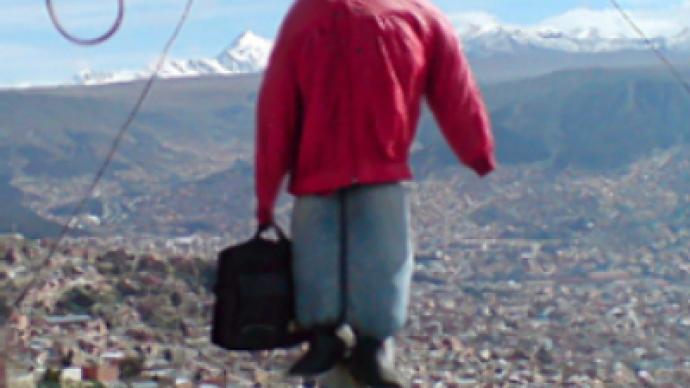Murderous lynch mobs spark safety fears in Bolivia

A mass lynching by supporters of the government causes problems as the ruling party attempts to legalize community justice in the proposed constitution.
On Sunday (23.11.08) a huge lynching took place in the small town of Achacachi, 100 km north of La Paz. Eleven alleged thieves were caught at a fiesta and taken to the town’s football stadium, where they were beaten up and set alight. Two died and nine others, including five women, were hospitalized.
The alleged thieves acted as an organized syndicate. They were on their own bus, which they use to travel between fiestas, when they were captured. More than 2,000 people are reported to have been involved in the attack.
Achacachi is a bastion of the “poncho rojos” (red ponchos), a militant group of Aymara indigenous people that supports the MAS government. The town’s mayor, Eugenio Rojas, one of the poncho rojos, prevented more people being killed.
Bolivian Radio Fides reported that a nearby army unit had tried to intervene, but local residents would not allow them to stop the lynching.
Minister’s condemnation tempered by understanding
The government of Evo Morales—the first indigenous president in South America—has shown some understanding for the attacks. Speaking to Radio Erbol, Bolivia's deputy interior minister, Ruben Gamarra acknowledged that the incident was “a reaction of the public by virtue of the fact that they have no confidence in the actions of prosecutors and the judiciary.” One of the alleged thieves was an off-duty policeman.
The minister went on to pledge that the attackers would be punished, which has provoked an angry response from the local population. The market village, 3,800 meters high on Bolivia’s Altiplano, only has a population of 7,900 but they are fiercely independent.
Since the attack, a pact of silence has been declared in the Aymara town. There are no police here now and the army is keeping a low profile. Strangers are viewed with suspicion and journalists are in danger. There is little government representation since the mayor declared civil law. It seems unlikely anyone will ever be charged.
Question marks over community justice
The implications are complicated for the MAS government, which now opposes a group of its traditional supporters. While advocating legal recognition for many indigenous traditions and institutions—such as community justice—the government says that lynching cannot be tolerated.
Deputy interior minister, Ruben Gamarra called on the residents of Achacachi to “put aside violent attitudes” and said “vigilante justice is not community justice”.
There is much debate in Bolivia about what community justice entails. Lynching is not uncommon in government-supporting indigenous communities in Bolivia, where the police have little presence or respect. In February, three policemen were lynched in Cochabamba—nine months later, no one has been charged. Stuffed mannequins hanging from lampposts are also commonplace—a warning and symbol of what the local people do to thieves.
The legal system’s infrastructure is poor and corrupt, so there is little faith in the functioning of ordinary justice. For centuries, there has been a tradition within indigenous Andean villages to practice some form of community justice. Its value is recognized by some groups around Latin America. USAid supports programs advocating the principles and procedures of community justice in Colombia, Guatemala and Peru, and claims “impressive” results.
The government plans to enshrine community justice’s legality in the proposed constitution, which goes to referendum on 25th January 2009. Proponents of community justice’s formal recognition point out that it traditionally emphasizes reconciliation and rehabilitation. It has served a valuable purpose in quickly providing justice in places where the formal legal system is ineffective and a long way away.
Critics, such as Human Rights Watch, say the constitutional recognition of community justice “endangers some of the fundamental rights of Bolivian citizens”. The violent incident in Achacachi feeds the worst fears and prejudices of the mestizo population (European descendant Bolivians) in the lowlands of this deeply divided country.
Jonathan Stibbs for RT












